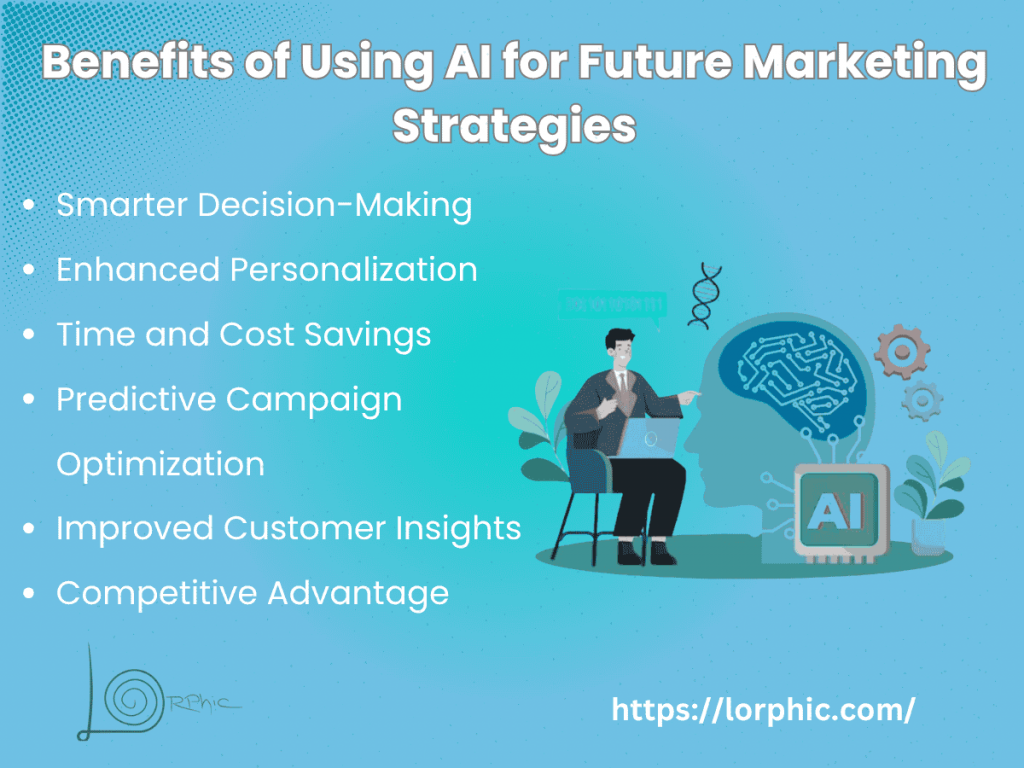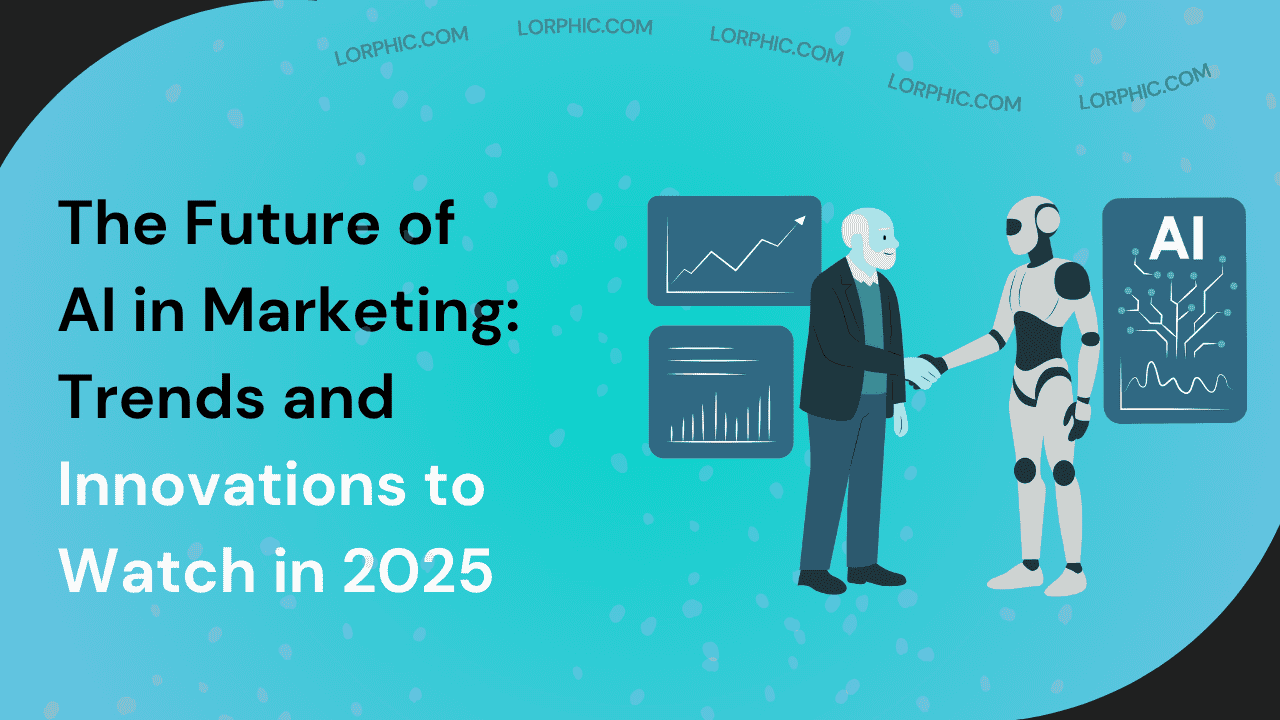Artificial Intelligence has moved from being a futuristic idea to a key driver of change in marketing. Today, AI helps businesses predict customer behavior, deliver personalized content, and run automated campaigns, making it easier to reach the right audience at the right time.
In 2025, AI in marketing is evolving even further, offering smarter strategies, improved customer experiences, and stronger returns on investment. To stay competitive, businesses need to understand emerging trends, potential benefits, and how to adapt their marketing strategies for an AI-driven world. This guide will explore what is the future of AI in marketing.
Why AI Matters for the Future of Marketing?
Artificial Intelligence is transforming marketing by helping businesses make sense of massive amounts of data that would be impossible to process manually. Today’s marketers face enormous volumes of information, from customer behaviors to real-time performance metrics, and AI provides the tools to turn this data into actionable insights.
Key reasons AI is essential for the future of marketing include:
- Data-Driven Decision Making: AI can examine large datasets to uncover trends, preferences, and opportunities. This enables marketers to plan campaigns, create content, and target audiences with greater accuracy and confidence.
- Hyper-Personalization: Modern consumers expect experiences that feel tailored to them. AI allows brands to deliver personalized recommendations, emails, and ads at scale, enhancing engagement and loyalty.
- Efficiency and Automation: Repetitive tasks such as email segmentation, posting on social media, and ad optimization can be managed by AI, giving marketers more time to focus on creativity and strategic planning.
- Predictive Insights: By analyzing past behaviors, AI can forecast future actions, allowing businesses to anticipate customer needs and respond proactively rather than reacting after the fact.
Companies using AI in social media marketing and email marketing are already seeing higher engagement, better conversions, and stronger customer loyalty. In 2025, the ability to quickly understand and respond to customer behavior will be a major advantage in an increasingly competitive market. According to recent research, the global AI‑in‑marketing market is projected to reach US $47.32 billion in 2025, highlighting just how central AI has become to marketing strategy.
Future of AI in Marketing (2025 and Beyond)
The future of AI in marketing is focused on innovation, smarter automation, and improved customer experiences. As we move through 2025, several trends are set to shape how businesses connect with their audiences and optimize campaigns.
1. Hyper-Personalization at Scale
AI will allow marketers to deliver highly tailored experiences across all channels. From customized email campaigns to unique product suggestions, AI can adjust content based on user behavior, purchase history, and preferences. E-commerce brands can present dynamic product recommendations, while content platforms can suggest articles or videos that match each user’s interests.
2. AI-Powered Content Creation
Content marketing will increasingly depend on AI tools for idea generation, drafting, and optimizing copy. These tools help save time, improve content quality, and provide insights for SEO and audience engagement. AI-supported content creation ensures marketing teams can produce relevant and high-performing material more efficiently.
3. Predictive Analytics for Smarter Marketing
Predictive analytics will play a major role in planning campaigns. AI can forecast customer behavior, identify high-value segments, and optimize marketing strategies before launch. This enables better budget allocation, reduces wasted spend, and improves overall campaign performance and return on investment.
4. Conversational AI and Chatbots
Chatbots and voice assistants will continue to enhance customer interactions. By offering real-time support, personalized guidance, and interactive experiences, conversational AI helps build loyalty and strengthens the relationship between brands and consumers.
5. Voice and Visual Search Optimization
As smart devices and AI-powered search tools become more common, optimizing content for voice and visual search will be essential. Brands that adjust their marketing for these technologies can reach audiences through new platforms such as voice assistants, augmented reality experiences, and visual discovery applications.
6. Generative AI and Creative Assistance
Generative AI will assist marketers in creating visuals, videos, and campaign concepts. While human creativity remains crucial, AI can speed up production, provide inspiration, and support innovative marketing strategies, allowing teams to experiment and scale creative efforts more effectively.
These trends show that AI in marketing is not only about automation but also about creating smarter, more personalized, and engaging customer experiences. Businesses that adopt these technologies early will be well-positioned to stay ahead in 2025 and beyond.
Benefits of Using AI for Future Marketing Strategies
Integrating AI into marketing strategies offers numerous advantages that help businesses stay competitive and deliver better results. Below are some of the key benefits:

1. Smarter Decision-Making
AI helps marketers make decisions based on data rather than assumptions. By analyzing large amounts of information, it identifies patterns and trends that guide more effective campaign strategies and targeting decisions.
2. Enhanced Personalization
AI enables marketers to create tailored messages and experiences for individual users. Personalized recommendations, email content, and offers increase engagement, build loyalty, and boost conversion rates.
3. Time and Cost Savings
Automating repetitive tasks such as social media posting, content scheduling, and email targeting allows marketing teams to focus on strategic and creative work. This not only saves time but also reduces operational costs.
4. Predictive Campaign Optimization
AI can forecast the performance of campaigns by analyzing past data. This allows marketers to make proactive adjustments, refine strategies, and continuously improve results before launching campaigns.
5. Improved Customer Insights
By studying user behavior, AI provides a deeper understanding of audience preferences and emerging trends. These insights help marketers design campaigns that are more relevant and effective.
6. Competitive Advantage
Companies that adopt AI early can respond faster, optimize campaigns more efficiently, and offer superior customer experiences. This creates a strong competitive edge over businesses relying solely on traditional marketing approaches.
How Businesses Can Prepare for the AI-Driven Marketing Future?
Successfully integrating AI into marketing strategies requires thoughtful planning, preparation, and ongoing management. As we move into 2025, businesses that embrace AI thoughtfully will gain a significant advantage over competitors. Here are key steps to get ready for an AI-driven marketing future:
- Evaluate Current Marketing Processes: Start by reviewing existing marketing workflows to identify areas where AI can add the most value. This could include content creation, ad performance optimization, customer segmentation, lead scoring, or social media management. Understanding where AI can make the biggest impact helps prioritize implementation and ensures resources are used efficiently.
- Invest in the Right AI Tools: Selecting the appropriate AI tools is crucial for success. Businesses should choose platforms that match their goals, team capabilities, and budget. Options include tools for content marketing, predictive analytics, email marketing automation, and social media management. Investing in the right tools ensures that AI implementation delivers measurable improvements.
- Train Your Marketing Teams: Even the best AI tools are only effective if teams know how to use them properly. Training employees on AI tools, interpreting data insights, and understanding ethical considerations allows marketers to combine AI intelligence with human creativity effectively. Ongoing learning and experimentation help teams adapt to changes as AI evolves.
- Ensure High-Quality Data: AI relies heavily on data to make accurate predictions and recommendations. Businesses must focus on collecting clean, complete, and up-to-date datasets. Regularly auditing and maintaining data quality ensures AI models produce reliable insights that drive smarter decisions.
- Maintain Human Oversight: AI excels at automation and analysis, but human judgment remains essential. Oversight ensures that content stays creative, brand messaging remains consistent, and ethical standards are upheld. Combining AI efficiency with human creativity allows companies to deliver campaigns that are both impactful and authentic.
By taking these steps, businesses can build a solid foundation for AI in marketing, leveraging technology to improve efficiency, engagement, and results while keeping humans at the center of strategy. Preparing now ensures that brands are ready to thrive in a rapidly evolving digital landscape.
Final Thoughts
The future of AI in marketing holds tremendous potential for businesses willing to embrace innovation. From delivering highly personalized experiences and predictive insights to generating content and managing customer interactions through chatbots, AI offers tools that can transform how brands connect with their audiences.
At the same time, AI is not a one-size-fits-all solution. Success depends on balancing automation with human creativity, maintaining strict data privacy standards, and providing teams with the right tools and training. When applied thoughtfully, AI can enhance efficiency, boost engagement, and drive stronger returns on investment while supporting the strategic goals of a business.
Looking ahead to 2025 and beyond, the brands that thrive will be those that integrate AI thoughtfully, ethically, and creatively. By using AI to complement human expertise rather than replace it, businesses can turn technology into a genuine competitive advantage and deliver meaningful experiences that resonate with their customers.
FAQ’s
What is the future of AI in marketing?
The future of AI in marketing is focused on creating smarter, more efficient campaigns. Businesses will use AI to deliver highly personalized experiences, predict customer behavior, and generate content that resonates with audiences. These advancements will help brands improve engagement, strengthen customer relationships, and achieve higher returns on investment.
How will AI change digital marketing in 2025?
In 2025, AI will play a central role in automating routine marketing tasks, such as scheduling content and managing ad campaigns. It will also allow marketers to optimize campaigns in real time and make data-driven predictions about audience preferences. This means businesses can deliver more relevant and personalized experiences to each customer, enhancing satisfaction and loyalty.
What are the biggest AI trends in marketing right now?
Some of the leading AI trends include delivering hyper-personalized content, using AI to create and optimize marketing materials, leveraging predictive analytics to anticipate customer needs, implementing conversational AI like chatbots, adopting generative AI for creative campaigns, and optimizing content for voice and visual search.
Curated by Lorphic
Digital intelligence. Clarity. Truth.




